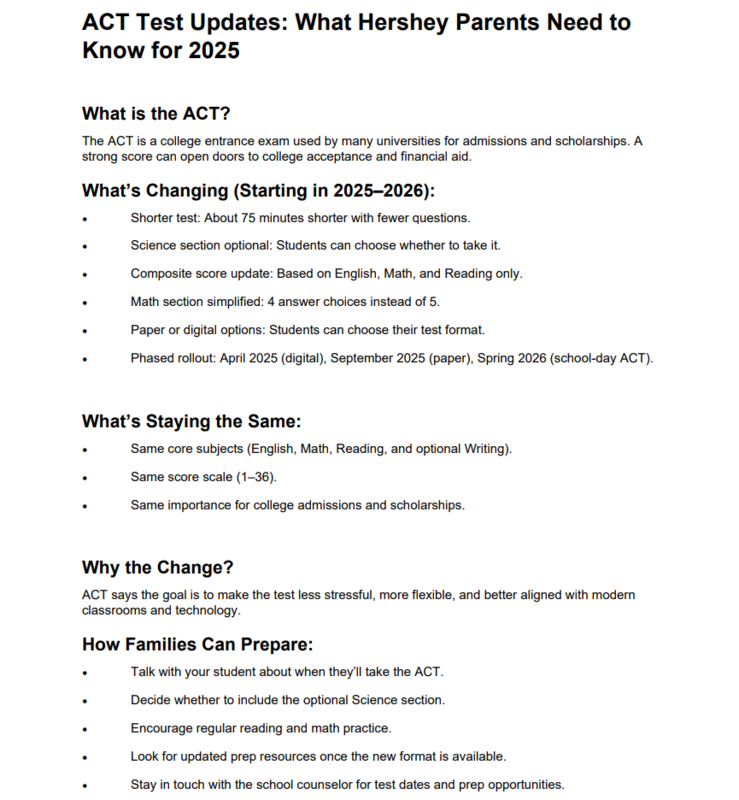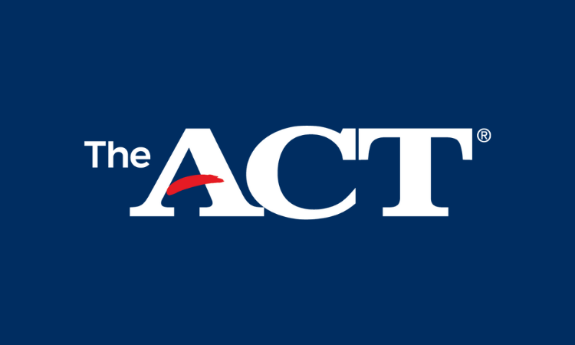As Hershey High students prepare for college and scholarship opportunities, it’s important to understand that the ACT test is changing beginning in 2025. Below is a breakdown of what’s new, why it matters, and how families can get ready.
What Is the ACT — and Why It Matters
The ACT (American College Testing) is a standardized exam many U.S. colleges use in admissions decisions.
A strong ACT score can help your college application and may qualify students for merit-based scholarships.
Currently, the ACT includes four main subject tests — English, Math, Reading, and Science — plus an optional Writing (essay) section.
What’s Changing — The “Enhanced” ACT
ACT, Inc. is rolling out several changes between April 2025 and Spring 2026. Here are the major updates:
Shorter exam & fewer questions
The revised ACT will be about 75 minutes shorter, with 44 fewer questions overall. This gives students more time per question and reduces testing fatigue.
Science section becomes optional
Like the Writing section today, the Science test will be one you can elect to take or skip.
Composite score changes
The “Composite” score (the overall score from 1 to 36) will now be calculated using only English, Math, and Reading. If a student takes the Science section, that score will be reported separately (and help form a STEM score).
Math multiple-choice options reduced
Math questions will now have 4 answer choices instead of 5.
Format options — paper or digital
Students will continue to have the choice between paper-and-pencil or digital testing formats (at participating test centers).
Phased implementation
April 2025: New format applies to digital national SAT-style ACT tests.
September 2025: New format also applies to paper/saturday tests.
Spring 2026: Changes roll out to school-day ACT (the test given in schools).
Why the Changes?
The goal of these updates is to make the ACT:
More flexible — letting students choose which sections to take.
Less stressful — by shortening the test and giving more time per question.
More modern — offering digital testing options and better alignment with how students learn and test today.
These changes are expected to benefit many students by reducing test anxiety and giving them greater control over how they are assessed.
What Students & Parents Should Do Now
Stay informed
Know which test dates your student will take (April, June, July, etc.) and whether that version will use the new format. All Juniors will take the state mandated ACT on April 8th, 2026 and sophomores will take the Pre-Act on the same date.
Decide whether to take Science or Writing
Because Science is optional, it will be strategic to decide whether it’s worth including based on your student’s strengths and college plans. For STEM or science-related majors, taking the Science section may still be beneficial.
Practice with new formats
Once the enhanced ACT practice tests become widely available, students should train on the new structure (shorter passages, fewer question counts, digital navigation if using that format).
Ask colleges directly
For schools your child is considering, check whether they require or prefer the Science section (or Writing) on the ACT. Admissions policies may adapt slowly. Reach out to Mrs. Pettera for more information regarding this!
Use support resources
Take advantage of school counseling, ACT prep sessions, and online tools. Hershey Public Schools offers "On to College" ACT test prep for all students in grades 7-12 and focus times 2x per month to work on ACT test prep!
Information compiled by Hershey High School using sources from ACT.org, Kaplan Test Prep, Prepmaven, and Progress Learning (2024–2025 updates).


